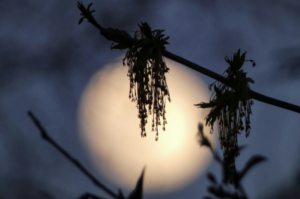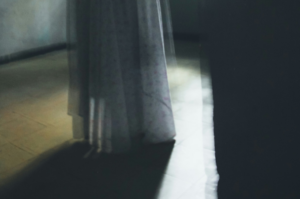
Faridah did not enjoy the presence of her own company, because she had no reason to. She was very gifted at filling spaces up with people, places and things. She learnt it from her mother, who learnt it from her mother, whose toes were burnt by that patch of soil several paces from her family home in Asaba. A town that never fully recovered from the quiet blood spillage of the 60s, despite the weddings and parties. She knew this because she still tasted it in the pounded yam, still felt the disconnect in the breaking of kola nut.
Faridah was a doer, an achiever, a sharp-mouthed sleek orange-brown mustard with a piercing smile, telltale eyebrows, and scattered piercings. She yearned for religiosity, superficially, despite fully practising her more convenient brand of agnosticism. She was interesting on paper but in her mirror, she saw nothing. She was nothing. She was constantly worn down by her exterior; her clothes felt heavy, even with the lightest material, because they felt borrowed, despite her collection of receipts. If given the option, she would rather drown in the social pleasantries than stay afloat in the reality of who she was, who she could be. This is why she welcomed any distraction that introduced itself with a smile and handshake, and made use of her underlying home advantage. Over the years, England had become a second home to her and, unlike her fellow Nigerian imports who did not have the appropriate lingo to describe this cold-water plunge some called freedom and others called homesickness, she clung to the festivities, the trains and taxis to Coventry from Birmingham, sometimes Essex, other times Manchester, and London was the ultimate.
Her mind was mostly vacant yet occupied, as she buckled down to study, but always succumbed to other matters, pleasurable and simple, like gigantic samosas from the Indian restaurant down the street, freshly baked cookie dough topped with whipped cream, peri-peri wings and Coca Cola, and the occasional McDonalds. Clinking plastic cups with her fellow delinquents, their names always on the tip of her tongue, never fully leaving her lips, because there was no need to say it when she could show it. Theirs was a weak camaraderie, subject to change at the drop of a hat, the slightest drop in decibel of the naira currency. The first few months were so brutal, because even the strongest swimmers cannot handle nature at its optimum. As the sun hid behind the clouds to make space for the heavy winds and icy rain, everything became a struggle. Going to class? A struggle. Going to town? A struggle. Eventually, Faridah spent more time with herself – against her will of course. The mere performance made her yawn so hard she would tear up, and then lull herself to sleep.
She didn’t know when she became so unmotivated, so numb to self-discovery, but she had no intent of pursuing the answer; she merely let the snapshots of water balloons, purple frosted cupcakes, white canopies and Sunday mass play in her mind. A young girl with a crown of white roses. Bubbles of happiness, burst. And just when she would get to the bottom of the ocean, she would find a distraction. Her most pleasurable distraction was Philip. They were in the same class, but sat on opposite sides of the room, until he ran late and wound up sitting next to her one Friday. He smelled like coconuts. She smelled like raspberries. His brown was firmer than hers, more pigmented, less even. He was handsome at first sight, but she very quickly got used to his looks. He was intelligent. He dressed well, but not too well. He could have a conversation, sometimes he even started them. And he liked her enough to lend her his biro, but not enough to let her keep it. She liked how comfortably plain he was. She was confident he liked her too. She hoped that he liked her because she had nothing to say when push came to shove. She was probably right, because thirty minutes into their first date, she realized that she did not have to talk. It was so nice to just eat. When they eventually kissed, it was full of fatigue and comfort, like a bowl of soup and an uninspired loaf of bread, and she loved it. This was it. At least, it was supposed to be.
Philip got greedy. Which was fine with her. Philip could do as he pleased. He was allowed, implicitly, to explore the wilderness, as long as the girls were loud. Philip learnt his philandering from his Ibibio father and his many girlfriends. All participants were well fed, albeit unhappy. Philip silently believed in the logic, that provision and physical presence trumped “western monogamy,” which he found to be primitive and low class. It was bearable, because he was very good at it. Faridah, in turn, was very good at turning a blind eye, because she was still a virgin, not entirely by choice, mostly by fear, and he allowed her to not feel bad about using his body to keep warm during the ember nights without some sort of release. It was unconventional, the implications of their arrangement, but it worked for them. They had a good thing going.
So, why was he smiling at Vanessa like that? This was not the usual, because Philip was loosening up. He spoke more. His touch grew increasingly sexual, no longer just flirtatious. Faridah would have chalked it up to hormones, and would have promptly deflected, but then she saw something that made her dizzy. Philip gave Vanessa his pen, and did not ask for it back. Two weeks later, he broke up with her. Faridah sank
— & cried
— dry tears
— inside
— for the rest of her university career.
She went back to her crowds, the parties, the food. She moved back to her old seating section. And she kept in touch with him, once she got over the first wave of heartbreak, because he was off to Paris for his year abroad, and she wanted to keep tabs on him, which she did until she couldn’t, an intoxicating cycle. They, of course, had “talks,” loud and wordless, where they would miss each other’s company, and Faridah always allowed herself to hope for a restoration. But this hope dwindled to a sickly flicker when Vanessa posted a picture of a plane, a croissant, a bouquet of roses, and two gloves holding hands. Eventually, Faridah moved on to other things, but never other people. There was no point.
She was grateful when her childhood friend Kosi came to England for a few months. Every other weekend, they would make Indomie and watch Nollywood movies. This went on, even at the height of final exam mania. Even when Faridah realised she would have to go back to Nigeria to complete her National Youth Service Corps before returning to England. Even when her mother bought her a one-way ticket. Even when she fought with her father on the phone.
Ten days before her departure, Philip texted her. He was back in town, newly single, and he wanted to take her on a date, to that restaurant they liked so much, or maybe something on the expensive side? He was a working man, and Faridah could tell that he had stories to tell. She was angry, excited, and curious. Everything was moving so quickly, maybe she could finally be silent again. Maybe they would get back together. Regardless, she surfed the web, went to the pharmacy, and bought every apparatus she could think of that would make this decision feel like hers rather than what it really was; a last-minute attempt to claim a substantial proprietary interest in her quest to sleep with him to “express her sexuality” whilst ignoring the way her heart creaked randomly, like it was trying to get her attention. Maybe if she did things right, made space for him, she would be able to ignore this mounting headache she had had for the past three days. Maybe his heart would grow half an inch bigger. Maybe they could be silent together. Whatever.
She was almost done getting ready for dinner when she realised she left her green cardigan at Kosi’s. She had other cardigans, but green was Philip’s favourite colour. But had she known it would rain the minute she stepped out of her apartment, she would not have bothered. By the time she got there, she was piss drenched. But it didn’t matter. Because Kosi was smiling, wider than usual. Before she could ask what was going on, a bespectacled woman emerged from the kitchen, wearing a white robe, but Faridah knew her eyes were glinting, the same way she knew there was an inhaler in her pocket, the same way she knew that she knew her, briefly but poignant. The summer of Kosi’s Holy Communion, where her mother made rose crowns and Kosi’s cousin came all the way from Port Harcourt, and then disappeared immediately after Mass, whisked away in a green Hummer, all the rage back in the day. Now she was standing in front of Faridah, and for the first time in a long time, Faridah choked on her words. Kosi thumped her back. And the rose crown girl stepped forward, because she knew that she remembered.
She knew that she remembered when they snuck into the kitchen and stole the piping hot meat pie minutes before they had to go to church. Her name is Aku, that she remembered.
“Hi,” she said softly. “How… how have you been?” Faridah could barely look at her. Kosi looked at the two of them and shook her head, “Your hair is an absolute mess! My God! We have to fix it for your date!”
“A date,” Aku commented. “Sounds like fun! We were going to watch a movie… maybe another time−”
“I have time for a movie,” Faridah cut in, she was shaking. “Hi Aku.”
“I was scared you wouldn’t remember me.”
“Oh no, no I remember you.”
Aku smiled, cheekily, “Good. Because I remember you.”
“I remember you.”
“Yeah.”
Aku touched Faridah’s hair, as if feeling for a pulse. They laughed.
“So you’re going on a date.”
“We’ll see. Depends on the movie you’ve picked.”
“Oh. Well, I guess I’ll have to pick from the top shelf.”
Photo by Jakayla Toney on Unsplash










Esther B December 28, 2023 04:08
An amazing read♥️